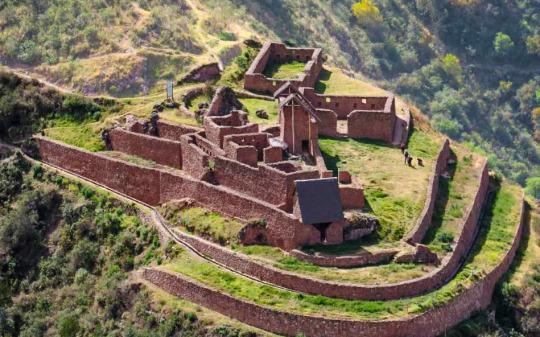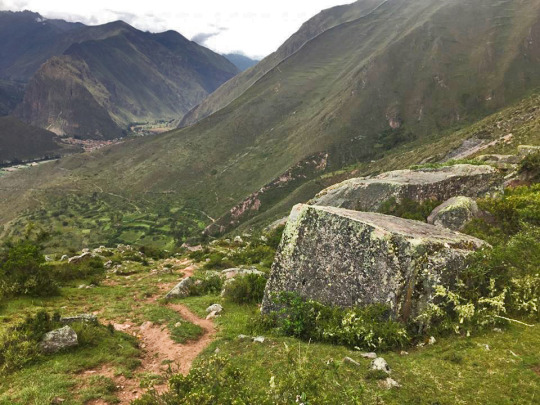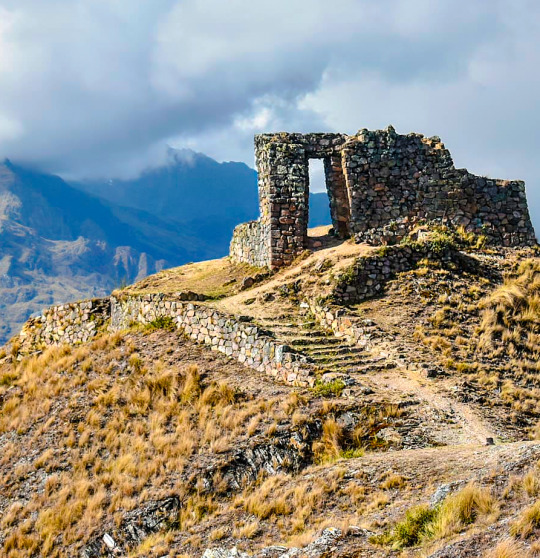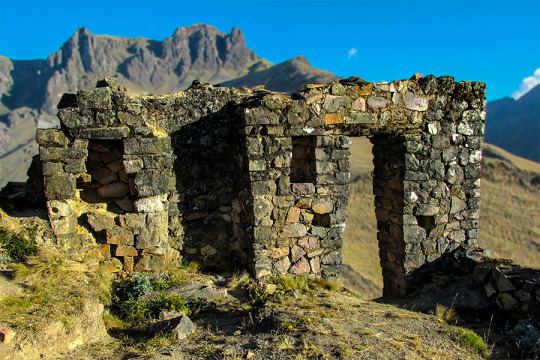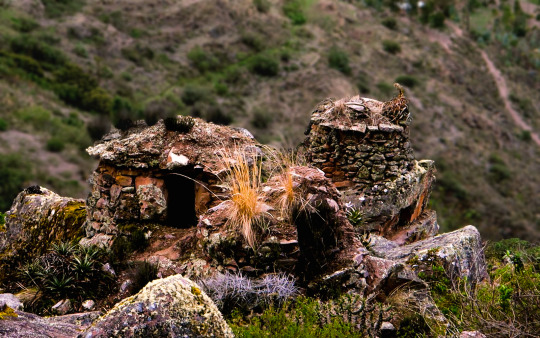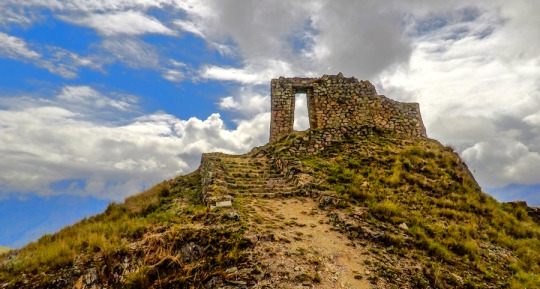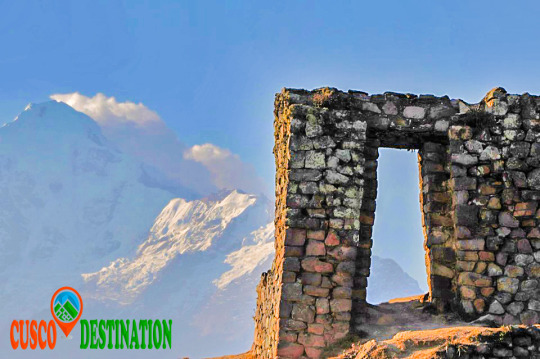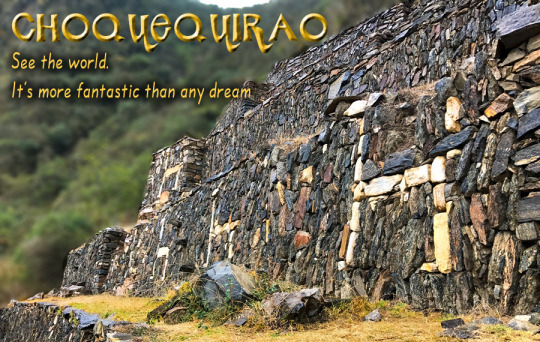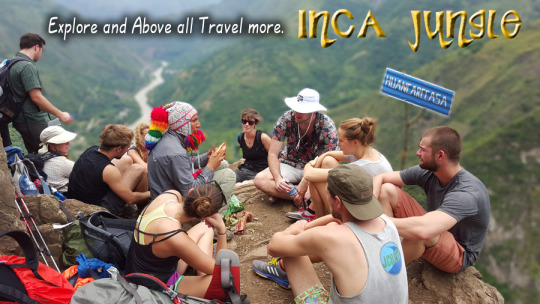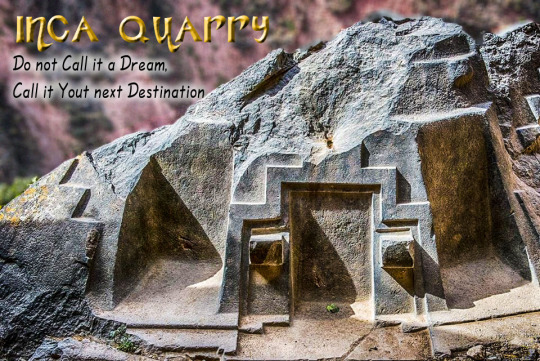Offering a fascinating look at the ingenuity of the Inca civilization, Inti Punku Cachicata is where the Incas formed rocks for some of their ambitious construction projects miles away, such as the Cantera Cachicata Ollantaytambo fortress. This exhilarating and scenic hike lasts 3-4 hours, crosses the Urubamba River on an ascending trail that offers panoramic views of the Ollantaytambo Valley, the Vilcanota mountain range, and Mount Veronica (18,745 ft) along the way. We will have lunch surrounded by magnificent views before returning to the Sacred Valley or Cusco.
INCA QUARRY TREK 3 DAYS
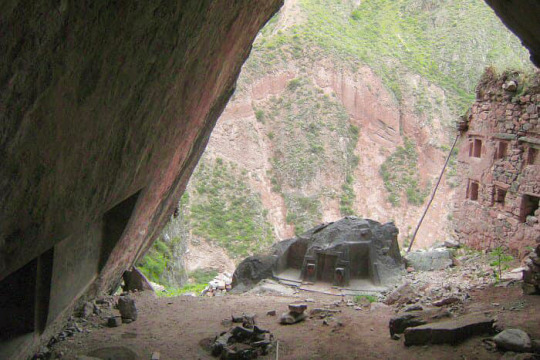
DAY 1: CUSCO – PACHAR - SOQMA – CHARCAHUAYLLA
We will come to pick you up at 5:00 a.m. from your hotel in Cusco City, and we will drive along a road to the Pachar Valley close to Ollantaytambo. You will arrive at the starting point of your trek, Soqma village, after about 2 hours, where we will stop to have breakfast and meet our horseman. We will start our hike up a lush valley of scattered farmhouses and crop terraces. After 40 minutes of walking, we will see a tall waterfall where we can pause to refresh ourselves amidst the cool spray of the waterfall. After a picnic lunch, we will continue hiking for another hour and visit the little-known Inca ruin of Qorimarca, perched at mid-altitude on a shelf high above the SoQma valley. Qorimarca was probably built by the Incas to control the agricultural production of the surrounding valley. From here we will hike uphill for 3 hours until we reach our first campsite, in Charcahuaylla.
DAY 2: CHARCAHUAYLLA – INTI PUNKU – CHOQUETACARPO – INCA QUARRY OF CACHICATA – OLLANTAYTAMBO – AGUAS CALIENTES
After breakfast, we will continue with our trek for 1.5 hours across the high plateau to reach the to Yana Orco, where we will have spectacular views of the valley. We will encounter a stunning view of Ollantaytambo and the Sacred Valley as we reach the imposing gateway of Intipunku, an Inca temple thought to be dedicated to worshiping the snowcapped Verónica Mountain. Then, we will arrive to Choquetacarpo (3600m/11880ft) and continue the descent to the Inca quarry of Cachicata (3420m/11286ft). Here, you can see the work of the Incas as this was used by the Incas for the construction of Ollantaytambo. You will see several large buildings, quarried stones left half finished and abandoned throughout the site.We will have lunch facing a breathtaking mountain and valley panorama. We will continue our hike for 3 and a half hours downhill to Ollantaytambo, where you will have some time to rest and explore the historic town. In Ollantaytambo, we will catch the train to the town of Aguas Calientes. Once there, you will have a dinner at a restaurant in the town and discuss with your guide what time you wish to wake up in the morning. Your hostel in Aguas Calientes can be upgraded to a hotel if you prefer.
DAY 3: MACHU PICCHU - CUSCO
After an early breakfast at the hotel, we walk uphill to Machu Picchu at 5:00 am. or take the bus from Aguas Calientes to Machu Picchu (Optional bus $16 each way), upon arrival at the Citadel we can appreciate the enigmatic beauty and the incomparable example of architectural perfection and hydraulics of one of the 7 Wonders of the Modern World, we will have a guided tour of about 2 hours, where we can appreciate the Main Plaza, the Circular Tower, Intihuatana, The Royal Quarters, the Temple of the Three Windows and the Cemetery, you are then given free time to stroll around the citadel . You will have all morning in Machu Picchu to take pictures, maybe to climb the Wayna Picchu or Machu Picchu Mountain, enjoy this mystical place. Then we´ll descend by bus to Aguas Calientes for lunch and then calmly return by train to Ollantaytambo where our tourist transport to the city of Cusco will be expecting us, and will later transfer you to your hotel.
OTHER ACTIVITIES:
Climb up Huayna Picchu and appreciate the beauty and magnificence of Machu Picchu from there (We recommend that you book in advance) Not Included
Climb Machu Picchu Mountain and appreciate the beauty and magnificence of Machu Picchu from there (We recommend that you book in advance) Not Included
Visit the new local museum or the hot springs in Aguas Calientes later in the day. Not Included
- Meals: Breakfast
- Tour: 2 hour guided tour of Machu Picchu
INCA QUARRY TREK CLASSIC 4 DAYS
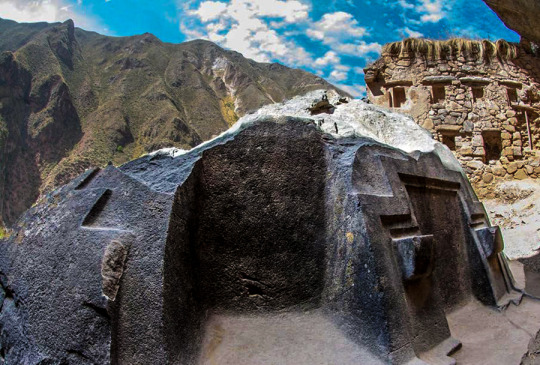
DAY 1: CUSCO – SOQMA – RAYAN
We will come to pick you up at 5:00 a.m. from your hotel in Cusco City, and we will drive along a road to the Pachar Valley close to Ollantaytambo. You will arrive at the starting point of your trek, Soqma village, after about 2 hours, where we will stop to have breakfast and meet our horseman. where we will stop to have breakfast and meet our horseman. We will start our hike up a lush valley of scattered farmhouses and crop terraces. After 40 minutes of walking, we will see a tall waterfall where we can pause to refresh ourselves amidst the cool spray of the waterfall. After a refueling lunch, we will ascend 45 minutes until our camp at Rayan (3,700 meters/12,136 ft).
DAY 2: RAYAN – INTI PUNKU – CHOQUETACARPO
After breakfast, we ascend 3 hours to the first pass of the trek, known as Puccaqasa (4,370 m/ 14,333 ft). where we will have spectacular views of the valley. We will encounter a stunning view of Ollantaytambo and the Sacred Valley. We then head downhill for 25 minutes to our lunch location. After lunch, we hike 2 hours with alternating ascents and descents. The final 20 minutes of this segment will take us uphill to the highest pass of the trek, Kuychicassa (4,457 m/ 14,619 ft), From here we trek downhill for 2 hours to a site the Incas called Inti Punku, where there is a spectacular view of Mount Veronica (5,682 m/ 18,637 ft) and the Sacred Valley of the Incas. Our campsites is 30 minutes downhill from Inti Punku at Choquetacarpo (3,600m/ 11,808 ft).
DAY 3: CHOQUETACARPO – OLLANTAYTAMBO – AGUAS CALIENTES
After early breakfast and then we will walk one hour downhill to the Inca quarry of Cachicata (3420m/11286ft). Here, you can see the work of the Incas as this was used by the Incas for the construction of Ollantaytambo. You will see several large buildings, quarried stones left half finished and abandoned throughout the site.We will have lunch facing a breathtaking mountain and valley panorama. After We will continue our hike for 3 and a half hours downhill to Ollantaytambo, where you will have some time to rest and explore the historic town. In Ollantaytambo, we will catch the train to the town of Aguas Calientes. Once there, you will have a dinner at a restaurant in the town and discuss with your guide what time you wish to wake up in the morning. Your hostel in Aguas Calientes can be upgraded to a hotel if you prefer.
DAY 3: MACHU PICCHU - CUSCO
After an early breakfast at the hotel, we walk uphill to Machu Picchu at 5:00 am. or take the bus from Aguas Calientes to Machu Picchu (Optional bus $16 each way), upon arrival at the Citadel we can appreciate the enigmatic beauty and the incomparable example of architectural perfection and hydraulics of one of the 7 Wonders of the Modern World, we will have a guided tour of about 2 hours, where we can appreciate the Main Plaza, the Circular Tower, Intihuatana, The Royal Quarters, the Temple of the Three Windows and the Cemetery, you are then given free time to stroll around the citadel . You will have all morning in Machu Picchu to take pictures, maybe to climb the Wayna Picchu or Machu Picchu Mountain, enjoy this mystical place. Then we´ll descend by bus to Aguas Calientes for lunch and then calmly return by train to Ollantaytambo where our tourist transport to the city of Cusco will be expecting us, and will later transfer you to your hotel.
OTHER ACTIVITIES:
Climb up Huayna Picchu and appreciate the beauty and magnificence of Machu Picchu from there (We recommend that you book in advance) Not Included
Climb Machu Picchu Mountain and appreciate the beauty and magnificence of Machu Picchu from there (We recommend that you book in advance) Not Included
Visit the new local museum or the hot springs in Aguas Calientes later in the day. Not Included
- Meals: Breakfast
- Tour: 2 hour guided tour of Machu Picchu






